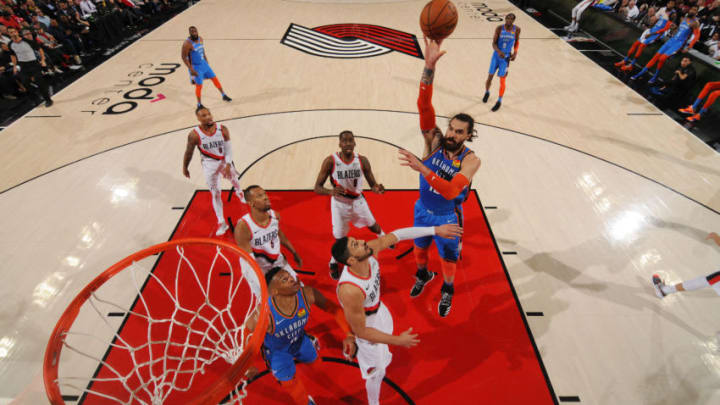
The key positional matchup the OKC Thunder could tweak to gain a win in Game 2 is the starting center role of Steven Adams versus Enes Kanter.
Prior to Game 1, there was a great deal of publicity surrounding the key matchups between the OKC Thunder and the Portland Trail Blazers. Who could’ve guessed that the center position would provide the most indispensable matchup of the series?
Before the opening tip, not a single analyst or commentator predicted Steven Adams would be outplayed on both ends by his former teammate Enes Kanter. Especially considering he was originally coming off the bench behind Jusuf Nurkic.
Earlier in Enes Kanter’s career, he was regarded as a defensive liability and nothing special offensively. He has improved tremendously on both ends, and Sunday night was indicative of how much he’s developed since leaving OKC.
Playing center in the NBA is truly a thankless job. Even with the emergence of stretch bigs, the center is still expected to run from rim to rim each and every possession, while being required to do the dirty work. The main reason the OKC Thunder lost was due to Kanter’s relentless effort.
.@Enes_Kanter had a monster Game 1 against his former team. 💪 pic.twitter.com/IrLw6KY8eb
— theScore (@theScore) April 14, 2019
In order to neutralize Enes Kanter, Adams will have to start by bodying up on Kanter whenever he has the ball. It’s unlikely that Kanter will have another 20 points and 18 rebounds, and one way to ensure that is by keeping him away from the paint at all costs. Adams can not allow Kanter to set up shop in the key and establish a position in the paint.
Here are the three keys to Adams winning the Game 2 battle.
Rebounding
Surprisingly the OKC Thunder were only outrebounded by one board, and it had nothing to do with skill, and everything to do with positioning and effort in the final minutes. Each key rebound that the Trail Blazers grabbed over the OKC Thunder came at the most inopportune moments of the game. With a more concentrated focus on boxing out and positioning, the game could’ve had a vastly different outcome.
One enormous factor for OKC Thunder to turn the tides in game 2, is to focus on moving Kanter out of the paint and securing rebounds on both ends. Rebounding starts with Steven Adams, but its the responsibility of each and every player on the court to box out after a miss and to hustle after long missed shots.
Spacing
More from Thunder News
- Stealing one player from every Southwest Division team for the OKC Thunder
- Should the OKC Thunder chase after a disgruntled hometown hero?
- 3 OKC Thunder players who can step up in Aleksej Pokusevski’s absence
- Aleksej Pokusevski sidelined approximately 6 weeks with ankle injury
- Damian Lillard does not fit with the OKC Thunder
There are very few players that can don the title of “old school bruising big man”, but the matchup between Enes Kanter and Steven Adams allows us to see two of them in action. Kanter benefited immensely from Adams being out of position and was able to capitalize with scoring put backs off offensive boards.
When Damian Lillard is taking and making 40 foot 3-pointers, the defense is tasked with having to spread out further than normal. This forces Steven Adams to have to compensate for the extra space in the lane. One way to combat this is by forcing Portland’s shooters to drive the lane, allowing Adams to contest their smaller guards at the rim.
Post Scoring
If Steven Adams wants to fully take advantage of Kanter in game 2 he has to exploit him in the post. With the strength advantage, Adams has the potential to battle Kanter for positioning and finish at the rim with his patented post hook or runner. Kanter had difficulty defending Adams in game 1, once he got to his sweet spot in the post. It was disappointing to see OKC give up on post scoring so early and simply revert back to the same pick and roll which they rely on so heavily.
Utilization of Adams in the paint will be a huge aspect of game 2. If he’s able to establish a rhythm in his wheelhouse, then it takes some of the scoring load off of Russell Westbrook and Paul George. Adams is going to be the key in game 2.
